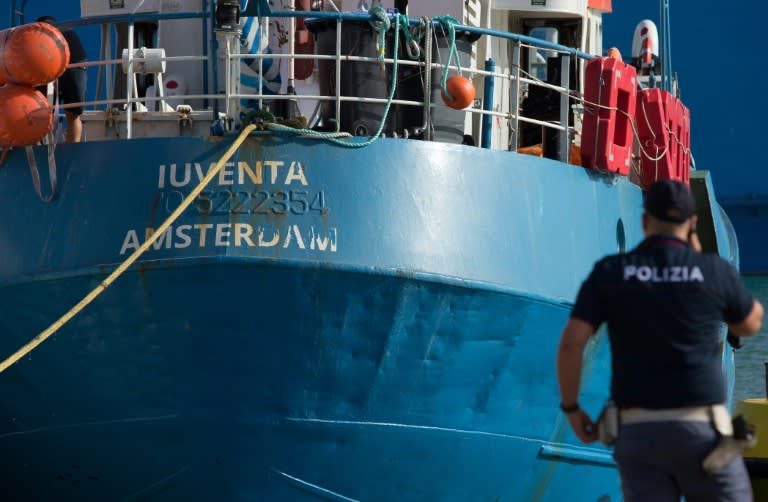Migrant rescuers vindicated after Italy court drops trafficking charges

An Italian court threw out charges Friday against crew members of migrant rescue ships, ending a controversial case seven years after the government accused them of colluding with traffickers.
Triggered by a tip-off by an ex-policeman on board and marked by the wire-tapping of lawyers and journalists, the long-running case had been highlighted as an extreme example of efforts by European governments to thwart NGOs helping migrants at sea.
The court in Trapani, Sicily dismissed all charges against 10 defendants from the Iuventa, Vos Hestia and Vos Prudence ships operated by German NGO Jugend Rettet, Save the Children and Doctors Without Borders (MSF), respectively -- following the recommendation of the prosecution in February.
Following the ruling, the Iuventa crew members said the case "stands as the longest, most expensive, and most extensive proceedings against SAR (Search-and-Rescue) NGOs, including two years of preliminary hearing with over 40 hearings".
"The Iuventa case marked the onset of a public smear campaign against civil sea rescue, aimed at legitimising crackdowns on rescue efforts," it said.
One of the defendants, Sascha Girke, told reporters that because of a "sloppy investigation due to political motives", the NGO had been prevented for years from doing rescues, resulting in the preventable deaths of "thousands of people".
Accused of facilitating illegal immigration from Libya to Italy in 2016 and 2017, the defendants had risked up to 20 years in prison.
They were accused of coordinating their search-and-rescue actions with human traffickers off Libya, returning dinghies and boats to them to be reused, and of rescuing migrants in the Mediterranean whose lives were not in danger.
- Migrant surge -
Italian authorities began to focus in on the rescue workers in 2016, as Rome's then centre-left government grappled with a double-digit percentage increase in the number of migrants reaching its shores.
About 181,000 migrants landed in Italy that year, as part of a wider surge that saw more than two million asylum-seekers enter the EU, many from war-torn Syria and Afghanistan.
A former policeman working as a security contractor on Save the Children's Vos Hestia ship first reported allegations that the charities were working with people traffickers.
Police placed an undercover agent on the ship, while investigators wire-tapped charity workers, lawyers and journalists -- a move that sparked outrage when it became public.
Charges were eventually brought in 2021 against 21 individuals from the Iuventa, Vos Hestia and Vos Prudence.
After the case was split into various separate proceedings last year, eight crew members and two ship captains remained as individual defendants in the case before the court Friday.
Three entities -- Save the Children, MSF and the shipping company that owned two chartered vessels -- were similarly charged, but cleared on Friday.
The judge Friday also lifted the seizure order for the Iuventa ship itself, dating from 2017. But the vessel remains "abandoned, plundered and largely demolished" at the port of Trapani, according to the NGO.
If possible and financially feasible, "we will repair the ship and sail out as soon as possible," said Iuventa defendant Dariush Beigui.
"It's needed that we go out."
- 'Criminalisation' of rescue workers -
Amnesty International, Human Rights Watch and even the UN's Special Rapporteur on the situation of human rights defenders had all criticised Italy for its "criminalisation" of volunteer migrant rescue workers, and for due process violations against defendants.
Despite Friday's win, similar targeting of rescue workers is ongoing elsewhere in Italy and Europe, human rights representatives said.
"The struggle continues," said Allison West of the European Center for Constitutional and Human Rights, who monitored the Iuventa hearings.
"This is one example in a much broader troubling trend we see in Europe... against people on the move and those in solidarity with them."
In Italy, the tough stance against migrant rescue NGOs has accelerated under Prime Minister Giorgia Meloni's hard-right government, which accuses the ships of encouraging people traffickers.
Rome has limited ships to one sea rescue at a time, and forces them to dock at an assigned port -- rules the charities say have severely curtailed rescues.
The government has also renewed a controversial EU-endorsed deal between Italy and the UN-backed Libyan government in Tripoli signed in 2017.
Under that deal, Italy provides training and funding to the Libyan coastguard to stem departures of migrants and fight traffickers.
ams/cw

